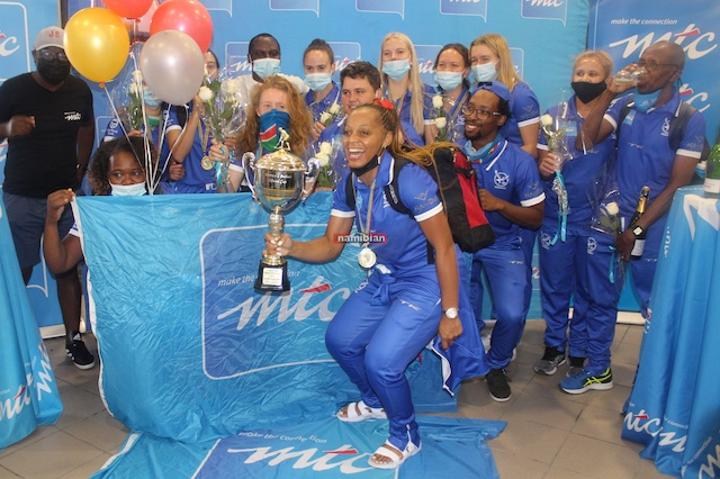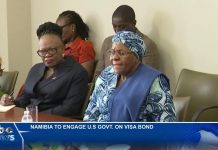Africa-Press – Namibia. IN a golden year for Namibian hockey, both the men and women’s national indoor teams qualified for the Indoor World Cup, while the women also walked away with the Team of the Year award at the Namibia Sport Awards.
The men’s team qualified by default after Australia and New Zealand withdrew due to Covid-19, but the women did it in style when they beat South Africa 2-0 in the Africa Cup final in Durban on 17 April.
South Africa were the favourites heading into the final after they beat Namibia 2-1 and 4-0 in their earlier group matches, but Namibia kept their best for last as they convincingly won the final through goals by Caitlin Gillies and Sunelle Ludwig.
SA created some early chances, but Namibian keeper Petro Stoffberg brought off two fine saves from Celia Seerane. Namibia weathered the early onslaught and took the lead at the end of the first quarter when they won a short corner and Caitlyn Gillies slammed the ball into the back of the net.
SA stepped up the pressure in the second quarter, but Stoffberg once again saved well from Kelly Reed, while Gillian Hermanus had a great match in Namibia’s defence.
With the pace picking up with attacks and counter-attacks, Namibia went 2-0 up midway through the third quarter when Sunelle Ludwig slammed home a fine pass from Gillies.
SA went all out onto the attack in the final corner, winning a few more short corners, but they couldn’t find a way past Stoffberg, who was in tremendous form, as Namibia held on for a fantastic victory.
Namibia’s men’s team failed to emulate their women as they went down 4-1 to South Africa in the men’s final. Namibia took the lead in the 12th minute through a great solo goal by Dakota Hansen, but South Africa equalised six minutes later when Mustaphaa Cassiem scored from a short corner.
The team’s were still tied 1-1 at the half time break, but SA gradually pulled away in the second half. Two goals in quick succession by Chad Futcher and Jethro Eustice put them 3-1 up, while Futcher added his second in the final quarter to complete a 4-1 victory for South Africa.
It was South Africa’s third successive victory against Namibia at the Africa Cup after they earlier won their group matches 6-3 and 9-3. A lifeline for the men
That seemed to have put paid to Namibia’s hopes of competing at the Indoor World Cup, but on 20 September, the president of the Namibia Hockey Union, Reagon Graig, confirmed that Namibia’s men had also been invited after Australia and New Zealand withdrew due to Covid-19 issues.
The International Hockey Federation (FIH) invited Namibia and the USA in the men’s section, while South Africa’s women also received a lifeline after being invited along with Canada in the women’s section.
“These four teams have been invited by the FIH (International Hockey Federation), based on each being the runners-up in their recently held African and Pan-American indoor championships, with a view to maintaining the balance between the number of participating teams per continent,” Graig said.
The Indoor Hockey World Cup which will be held in Liege, Belgium from 2 to 6 February 2022, will see 12 teams competing in the men and women’s competitions respectively.
In the men’s competition, Namibia will compete in Pool B along with Germany, Iran, the Netherlands, Belgium and the United States, while Pool A will consist of Austria, Russia, the Czech Republic, South Africa, Kazakhstan and Argentina.
In the women’s competition, Namibia will compete in Pool B along with the Netherlands, Belarus, Austria, South Africa and Belgium, while Pool A will consist of Germany, Ukraine, the Czech Republic, Kazakhstan, the United States and Canada.
Namibia’s u21 men and women’s teams, however, were not so fortunate, when Covid-19 put paid to their hopes of qualifying for the Junior World Cup. Namibia was supposed to host the Junior Africa Cup in August, but due to the escalating Covid-19 situation in the country at the time, the tournament was cancelled.
The Africa Hockey Federation subsequently announced that the 2016 African champions and runners-up would qualify for the Junior World Cup, with the result that South Africa and Egypt’s men’s teams and South Africa and Zimbabwe’s women’s teams qualified for the Junior World Cup.
In May, Namibia’s senior men’s team also played a friendly outdoor series against South Africa in Johannesburg, losing 5-0. Namibia’s best performance came in the second test which they lost 2-1, but they lost the other tests 7-0, 3-0, 6-0 and 5-0.
Saints return to the summit On the local scene, Saints returned to the summit of Namibian hockey when they were crowned the Men and Women’s Premier League champions on conclusion of the Bank Windhoek Outdoor Hockey League in November.
Saints’ men’s team regained the title they had conceded to Windhoek Old Boys last year, to win their third title in four years, while their women’s team won the title for the fourth year in a row.
Saints’ men went through the season unbeaten, winning all six their matches, while scoring 41 goals and conceding only three, to top the log on 23 points. Windhoek Old Boys Maroons finished second on 18 points, while DTS came third on 12 points.
Saints’ women also remained unbeaten, winning five and drawing one match to top the log on 21 points, followed by DTS on 16 and Windhoek Old Boys on eight points.
In April, Saints’ men also won the Indoor Hockey Premier League title for the fourth year in a row after beating Windhoek Old Boys 6-3 in the final, but there was a change of the guard amongst the women, with DTS beating Saints 5-1 to win their first title in eight years.
In the men’s playoff for third position, DTS beat the School of Excellence 6-2 after leading 1-0 at half time. In the women’s playoff for third position, Windhoek Old Boys beat Wanderers 5-2, after leading 2-0 at half time.
For More News And Analysis About Namibia Follow Africa-Press






